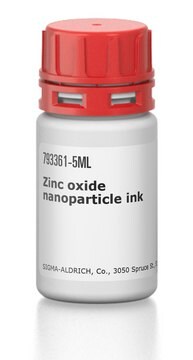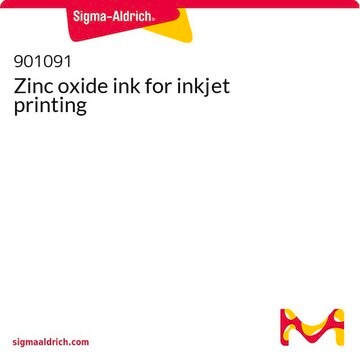918571
3D Printable Yttria-stabilized Zirconium(IV) Oxide Ink
Synonym(s):
3D printable ceramic ink, 3Y-ZrO2 ink, YSZ ink, Yttria stabilized zirconia ink, Yttrium stabilized zirconium oxide ink
About This Item
Recommended Products
description
Printing methods compatible with: Direct-Ink-Writing 3D printing
Quality Level
form
paste
greener alternative product characteristics
Design for Energy Efficiency
Learn more about the Principles of Green Chemistry.
sustainability
Greener Alternative Product
concentration
70 wt. % (Yttria stabilized zirconia)
color
white
particle size
120 nm
viscosity
2-25 Pa.s (25 °C at shear rate of 100 s-1)
greener alternative category
storage temp.
2-8°C
General description
Application
Caution
- Store in an airtight sealed container in refrigerator.
- Avoid exposure to heat.
- Add the thermal initiator (product No.479896) to 0.3wt% of the total 3Y-ZrO2/PEGDA ink mass, and mix well before usage.
Preparation Note
Direct-Ink-Writing (DIW) Notes:
- Syringe Nozzle sizes ranging from 250 μm − 800 μm can be used.
- Initial pressure for DIW printing ranges from 12-18 psi, depending on nozzle diameter used.
Post Processing of DIW printed parts:
- Curing @ 110°C for 12-16 hours.
- Sintering using the following sequence:
Ramp to 300°C @ 1°C/min. Hold for 4 hours.
Ramp to 400°C @ 1°C/min. Hold for 2 hours.
Ramp to 800°C @ 2°C/min. Hold for 4 hours.
Ramp to 1090°C @ 2°C/min. Hold for 15 hours.
Ramp down to 50°C @ 2°C/min.
Storage and Stability
Signal Word
Danger
Hazard Statements
Precautionary Statements
Hazard Classifications
Eye Dam. 1 - Skin Irrit. 2 - Skin Sens. 1 - STOT SE 3
Target Organs
Respiratory system
Storage Class Code
10 - Combustible liquids
WGK
WGK 3
Regulatory Listings
Regulatory Listings are mainly provided for chemical products. Only limited information can be provided here for non-chemical products. No entry means none of the components are listed. It is the user’s obligation to ensure the safe and legal use of the product.
ISHL Indicated Name
Substances Subject to be Indicated Names
ISHL Notified Names
Substances Subject to be Notified Names
JAN Code
918571-10G:
918571-BULK:
918571-VAR:
Choose from one of the most recent versions:
Certificates of Analysis (COA)
Sorry, we don't have COAs for this product available online at this time.
If you need assistance, please contact Customer Support.
Already Own This Product?
Find documentation for the products that you have recently purchased in the Document Library.
Articles
Additive manufacturing combined with nanomaterial-based inks enhances material properties, particularly in energy and environmental applications.
Our team of scientists has experience in all areas of research including Life Science, Material Science, Chemical Synthesis, Chromatography, Analytical and many others.
Contact Technical Service









